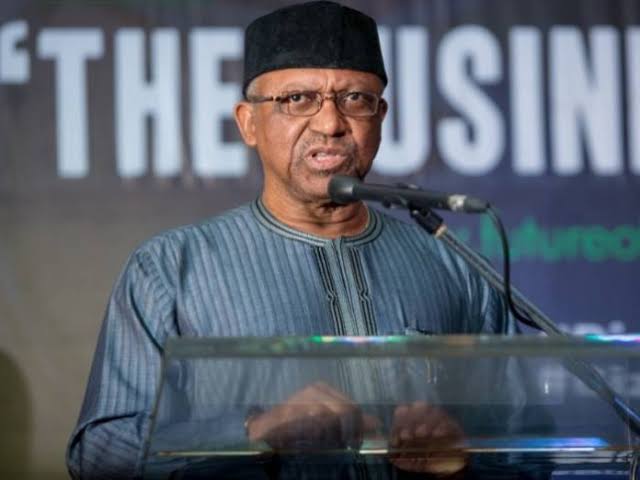
-Lawmakers urge review of Nigeria’s security architecture
President Muhammadu Buhari and security chiefs met at the Presidential Villa, Abuja over the rising insecurity in the country.
This is coming on the heels of the recent call by opposition politicians on the president to resign over his alleged inability to arrest the insecurity that has affected all parts of the country.
At the meeting, which details could not be ascertained before filling this story, such issues as the recent rise in attacks by bandits, renewed killings by insurgents and kidnapping were expected to be major issues on the agenda.
Those in attendance include the Chief of Defense Staff, General Gabriel Olonisakin; Chief of Army Staff, Lt. Gen. Tukur Buratai; Chief of Naval Staff, Vice Admiral Ibok Ekwe Ibas; Chief of Air Staff, Air Marshall Sadique Abubakar; Inspector-General of Police, Mohammed Adamu; Director-General of the National Intelligence Agency, Ahmed Rafa’i Abubakar; and the Director-General, Department of State Services, Yusuf Magaji Bichi.
Recently, Senate Minority Leader, Enyinnaya Abaribe called on the president to throw in the towel, alleging that Bugari has failed in his duty of protecting the country and its citizens.
This led to a clash between senators elected on the platform of the All Progressives Congress (APC) and their Peoples Democratic Party (PDP) counterparts.
Abaribe, while contributing to a motion sponsored by every serving senator, tagged “Nigerian security challenges: Urgent need to restructure, review and reorganise the current security architecture,” had said the APC-led government could not preside over the affairs of Nigeria.
He said: “President Muhammadu Buhari’s surprise surprised me. If not that you said we should not be partisan, I would have called out Femi Adesina, spokesman to Buhari. He called CAN a political party when it spoke out about a pastor who was killed by Boko Haram. That was insensitive. Those who live by propaganda shall die by propaganda.
“Boko Haram has been defeated and Nigeria is safer. What was supposed to be done to make Nigeria better was not done. Instead, it was propaganda. The time we would have used in fixing the problem of Nigeria was done blaming others.
“Nigeria didn’t elect the IGP. We didn’t elect other service chiefs. We elected APC government in 2015. When there is a problem, we go for the head. We are asking this government to resign because it can no longer perform its role.
“APC-led government told us that if they fail to perform, we should stone them. I think the time has come for us to fulfill that and stone them.”
When the tempers died down, the senators urged President Buhari to urgently declare a national security emergency to address the escalating challenges of insecurity in the country.
It also constituted an ad hoc committee to immediately engage the National Security Adviser, Mohammed Babagana Monguno, and heads of security agencies with a view to curbing the spate of insecurity in the country.
Among heads of security agencies that the ad hoc committee is expected to have an interface with are the Chief of Defence Staff, General Abayomi Gabriel Olonisakin; Chief of Army Staff, Lieutenant General Tukur Buratai; Chief of Naval Staff, Vice Admiral Ibok-Ete Ibas; Chief of Air Staff, Air Marshal Sadique Abubakar; and the Inspector-General of Police, Mohammed Adamu.
The composition of the ad hoc committee draws membership from the ranks of the Senate leadership and chairmen of relevant committees on security.
Earlier, Senate Leader, Yahaya Abdullahi, who sponsored a motion on the need to review the country’s security architecture, lamented the recent upsurge of security challenges accompanied by the devastating loss of lives and property.
The lawmaker, while calling on the executive to implement the new national security strategy unfolded in December last year, advised that it must be operationalised in a manner that takes critical review of the nature, structure and disposition of security institutions, particularly the police, civil defence, intelligence, customs and immigration.
Abdullahi added that “the various local, state and regional responses to these wwsecurity challenges by way of self-help initiative such as Civilian Joint Task Force, Hisba, Yausakai, Yanbanga and, more recently, Amotekun, are mainly expression of people’s desperation and disappointment with the failure of the state security architecture to protect them.”
The lawmaker further stated that “the current structure, operational strategies, personnel training and disposition of these critical institutions has been outgrown by our contemporary security challenges.”
Senators who took their turns to speak on the floor during the debate which lasted over three hours, called for the removal of the Service Chiefs who they faulted for running out of ideas on developing strategies needed to address Nigeria’s escalating security problems.
Some endorsed the introduction of community and state policing as a way out of the spate of insecurity in various states of the federation.
Senator Adamu Aliero (APC, Kebbi Central), while supporting claims that the Police force is overwhelmed by the country’s new security challenges, called for an amendment of the Constitution in line with providing for community or state policing to compliment the efforts of security agencies.
Accordingly, the senate mandated the Ad-Hoc committee to engage the National Security Institution to discuss their operational structures, funding, equipment and staff disposition with a view to reviewing the national security architecture to make it more responsive to tackling the myriad security challenges faced by Nigeria.
It also urged the committee to produce a draft implementation modality and blueprint on the ways and means of tackling the current security challenges for the consideration of the upper chamber.



